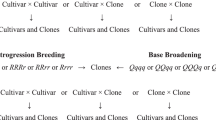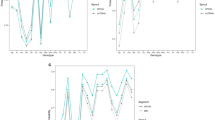Summary
For the induction and selection of double mutants with altered starch composition, a uniform (homohistont) amylose-free (amf) monoploid as basic plant is of vital importance. Therefore, newamf monoploids had to be developed via prickle pollination. And 26 monoploids were obtained which were screened in vitro for vigour, leaf size and for the percentage of monoploid cells. The number of monoploid cells was underestimated at about 28%. Seven vigorous monoploids were tested in vitro for tuberization capacity, which varied from 0 to 100%. After regeneration in vitro, 0 to 3.7 adventitious shoots per leaf explant were formed. The tuberization capacity of these shoots varied from 0 to 48. Twoamf monoploids were selected which were vigorous and tuberized well in vitro. They are the basis for the application of an in vitro mutation breeding protocol that should lead to the induction and selection of new starch mutants in potato.
Similar content being viewed by others
References
Ahloowalia, B.S., 1998. In-vitro techniques and mutagenesis for the improvement of vegetatively propagated plants. In: S.M. Jain, D.S. Brar & B.S. Ahloowalia (Eds), Somaclonal Variation and Induced Mutations in Crop Improvement. Kluwer Academic Publishers, Dordrecht, pp. 293–309.
Breukelen, E.W.M., M.S. Ramanna & J.G.Th Hermsen, 1975. Monohaploids (n=x=12) from autotetraploidSolanum tuberosum (2n=4x=48) through two successive cycles of female parthenogenesis.Euphytica 24: 567–574.
Donini, P. & A. Sonnino, 1998. Induced mutation in Plant Breeding: Current status and future outlook. In: S.M. Jain, D.S. Brar & B.S. Ahloowalia (Eds), Somaclonal Variation and Induced Mutations in Crop Improvement. Kluwer Academic Publishers, Dordrecht, pp. 255–291.
Frandsen, N.O., 1968. Die Plastidenzahl als Merkmal bei der Kartoffel.Theoretical and Applied Genetics 38: 153–167.
Hermsen, J.G.Th. & J. Verdenius, 1973. Selection from Solanum tuberosum group phureja of genotypes combining high-frequency haploid induction with homozygosity for embryo-spot.Euphytica 22: 244–259.
Hovenkamp-Hermelink, J.H.M., E. Jacobsen, L.P. Pijnacker, J.N. de Vries, B. Witholt & W.J. Feenstra, 1988. Cytological studies on adventitious shoots and minitubers of a monoploid potato clone.Euphytica 39: 213–219.
Hovenkamp-Hermelink, J.H.M., E. Jacobsen, A.S. Ponstein, R.G.F. Visser, G.H. Vos-Scheperkeuter, E.W. Bijmolt, J.N. de Vries, B. Witholt & W.J. Feenstra, 1987. Isolation of an amylose-free starch mutant of the potato (Solanum tuberosum L.).Theoretical and Applied Genetics 75: 217–221.
Hussey, G. & N.J. Stacey, 1984. Factors affecting the formation of in vitro tubers of potato (Solanum tubersoum L.).Annals of Botany 53: 565–578.
Hutten, R.C.B., E.J.M.M. Scholberg, D.J. Huigen, J.G.Th. Hermsen & E. Jacobsen, 1994. Analysis of dihaploid induction and production ability and seed parent×pollinator interaction in potato.Euphytica 72: 61–64.
Irikura, Y., 1975. Induction of haploid plants by anther culture in tuber-bearing species and interspecific hybrids of Solanum.Potato Research 18: 133–140.
Jacobsen, E., M.S. Ramanna, D.J. Huigen & Z. Sawor, 1991. Introduction of an amylose-free (amf) mutant into breeding of cultivated potato,Solanum tuberosum L.Euphytica 53: 247–253.
Jacobsen, E., H.T. Krijgsheld, J.H.M. Hovenkamp-Hermelink, A.S. Ponstein, B. Witholt & W.J. Feenstra, 1990. Revertants of the amylose-free potato clone 86.040 (2n=1x=12).Plant Science 67: 177–182.
Jacobsen, E., M.J. Tempelaar & E.W. Bijmolt, 1983. Ploidy levels in leaf callus and regenerated plants ofSolanum tuberosum determined by cytophotometric measurements of protoplasts.Theoretical and Applied Genetics 65: 113–118.
Karp, A., R. Risiott, M.G.K. Jones & S.W.J. Bright, 1984. Chromosome doubling in monohaploid and dihaploid potatoes by regeneration from cultured leaf explants.Plant Cell, Tissue Organ Culture 3: 363–373.
Leij, F.R. van der, R.G.F. Visser, A.S. Ponstein, E. Jacobsen & W.J. Feenstra, 1991. Sequence of the structural gene for granule-bound starch synthase of potato (Solanum tuberosum L.) and evidence for a single point deletion in theamf allele.Molecular and General Genetics 228: 240–248.
Leij, F.R. van der, H. Enequist, P. Terpstra & W.J. Feenstra, 1992. Chimerism as the basis for the occurrence of amylose synthesizing clones derived from an amylose-free potato mutant.Plant Science 81: 135–139.
Lillo, C., 1985. A simple two-phase system for efficient in vitro tuberization in potato.Norwegian Journal of Agricultural Sciences 3(1):23–27.
Murashige, T. & F. Skoog, 1962. A revised medium for rapid growth and bioassays with tobacco tissue culture.Physiologia Plantarum 15: 473–497.
Ramulu, K.S. & F. Dijkhuis, 1986. Flow cytometric analysis of polysomaty and in vitro genetic instability in potato.Plant Cell Reports 3: 234–237.
Shannon, J.C. & D.L. Garwood, 1984. Genetics and physiology of starch development In: R.L. Whistler, J.N. Bemiller & E.F. Paschall (Eds), Starch: Chemistry and Technology. Academic Press, Orlando, Florida, U.S.A., pp. 26–79.
Tempelaar, M.J., E. Jacobsen, M.A. Ferwerda & M. Hartogh, 1985. Changes of ploidy level by in vitro culture of monohaploid and polyploid clones of potato.Zeitschrift für Pflanzenzüchtung 95: 193–200.
Uijtewaal, B.A., D.J. Huigen & J.G.Th. Hermsen, 1987. Production of potato monohaploids (2n=x=12) through prickle pollination.Theoretical and Applied Genetics 73: 751–758.
Author information
Authors and Affiliations
Rights and permissions
About this article
Cite this article
Hoogkamp, T.J.H., Van Den Ende, R.G.T., Jacobsen, E. et al. Development of amylose-free (amf) monoploid potatoes as new basic material for mutation breeding in vitro. Potato Res 43, 179–189 (2000). https://doi.org/10.1007/BF02357958
Accepted:
Issue Date:
DOI: https://doi.org/10.1007/BF02357958




